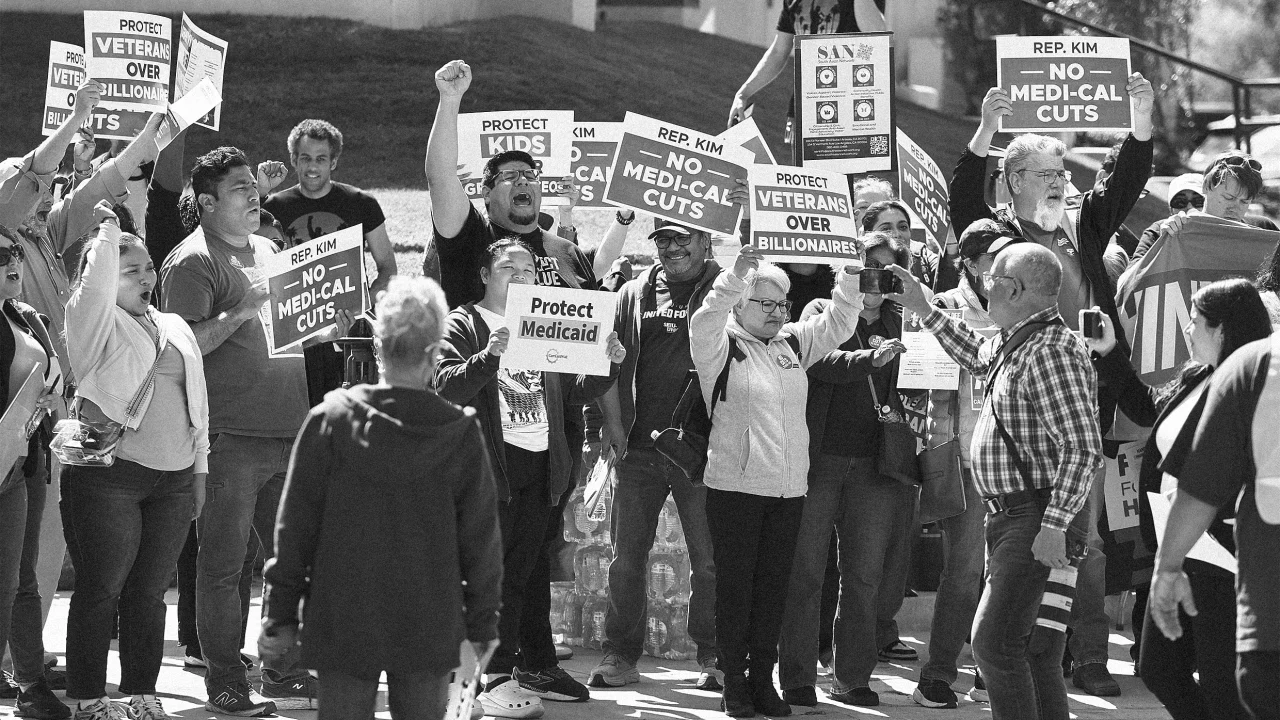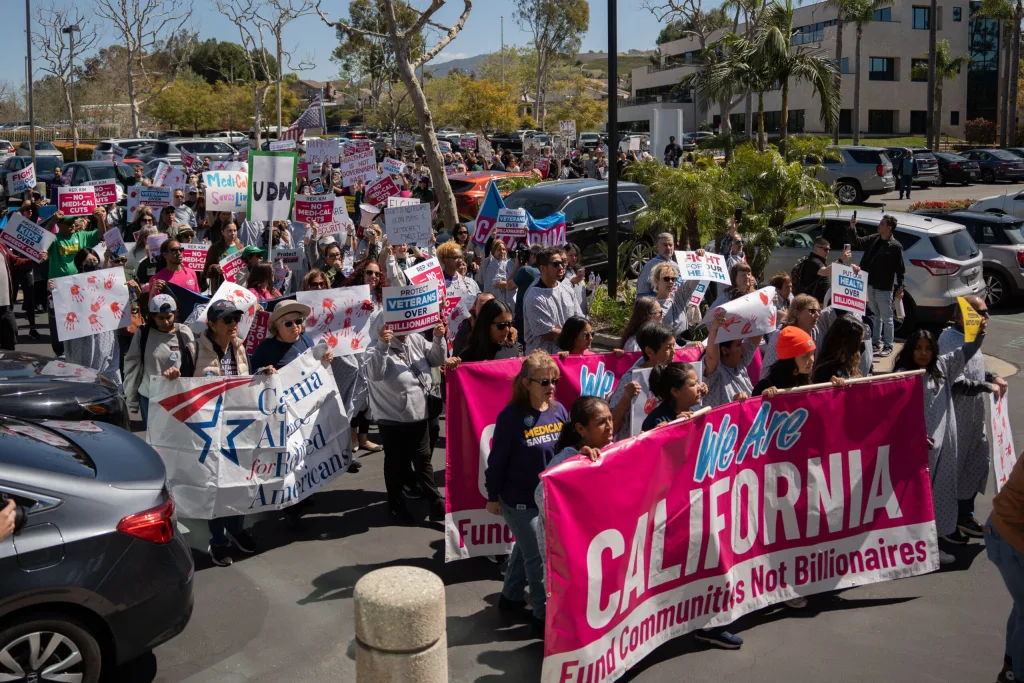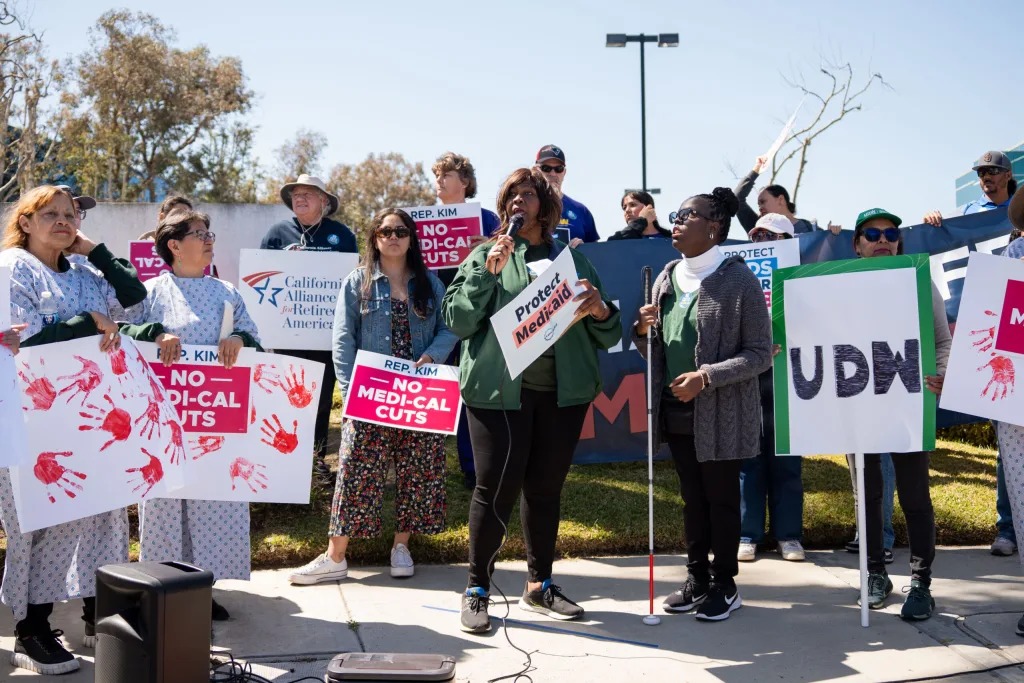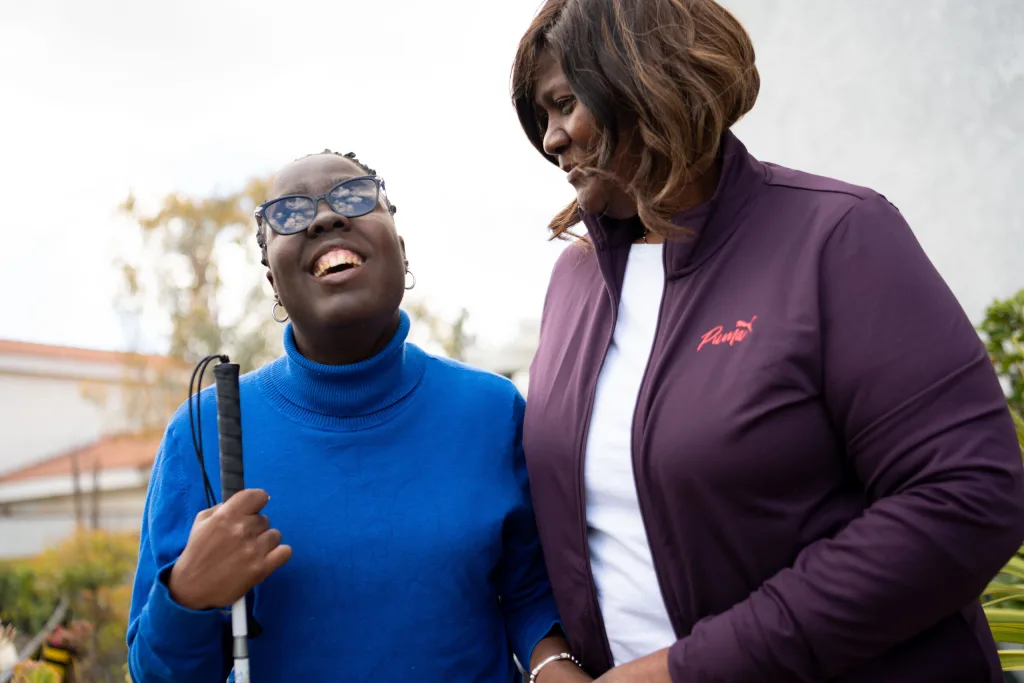House Republicans want to gut Medicaid. In California, that could cost them their seats
House Republicans passed a budget plan last week that could slash up to $880 billion over 10 years from Medicaid, a program that provides health insurance to 83 million low-income Americans. For the past several months, healthcare advocates have been ramping up pressure on three vulnerable California Republicans in Congress—Representatives Ken Calvert, Young Kim, and David Valadao—urging them to break ranks and reject those cuts when the final budget comes up for a vote in the coming months. All nine of California’s Republican representatives voted in February to advance the GOP’s budget blueprint, which calls for massive cuts to Medicaid. But of the nine, Calvert, Kim, and Valadao won their seats in 2024 by the narrowest margins—3, 11, and 7 percentage points, respectively. Healthcare advocacy groups and unions that represent healthcare workers are hoping to take advantage of their vulnerability by energizing voters in their districts to demand they vote against Medicaid cuts or else face massive backlash when up for reelection in 2026. The campaign is being spearheaded by advocacy groups Health Access California and Protect Our Care, as well as We Are California, a coalition of state and local community organizations. United Domestic Workers, which represents more than 170,000 home care and childcare providers in California, and the Service Employees International Union, which represents more than 2 million service workers across the country, are also playing a leading role in the campaign. (Disclosure: The SEIU and United Domestic Workers are both financial supporters of Capital & Main.) Protesters march in front of their Republican representative’s office in Southern California. [Photo: Jeremy Lindenfeld/Capital & Main] Those groups have organized protests in front of the district offices of Calvert, Kim, and Valadao; coordinated letter-writing campaigns; aired digital and TV ads; and hosted town halls at which constituents speak about the importance of Medicaid, which is known as Medi-Cal in California. Though the representatives have been invited to attend those town halls, none have. The campaign aims to mobilize voters like Cynthia Williams, who attended a March protest outside Kim’s Anaheim office. She told the hundreds in attendance that she felt betrayed by the congresswoman she had supported. “It was like a slap in the face,” Williams said. “It was like somebody saying, ‘You don’t matter. Your family doesn’t matter.’ We helped vote to get this lady in there and this is what we get? It’s wrong. It’s totally wrong.” Orange County, California, resident Cynthia Williams speaks at a rally outside her local representative’s office. [Photo: Jeremy Lindenfeld/Capital & Main] Williams voted for Kim in 2024, believing that the Republican congresswoman was “on the same page with us as far as Medicaid.” But after the congresswoman voted in February to advance a budget blueprint that would slash the program, Williams became an outspoken critic of Kim. Williams’s full-time job is taking care of her adult daughter Kailee, who is blind and has an intellectual disability and cerebral palsy, and her sister Shanta, who is a veteran with post-traumatic stress disorder and other severe mental disabilities. Both Kailee and Shanta receive funding from In-Home Supportive Services, a public program in California that provides support to more than 700,000 low-income Californians with disabilities or who are 65 and older by funding caregivers like Williams. Because In-Home Supportive Services receives most of its funding from Medicaid, many fear cuts would reduce or even eliminate programs that support people with disabilities. Cynthia Williams, right, relies on a public health program to care for her daughter, Kailee, who is blind. [Photo: Jeremy Lindenfeld/Capital & Main] That’s why United Domestic Workers, of which Williams is a member, has joined in the efforts to pressure vulnerable Republican representatives against voting to cut critical healthcare funding. And according to Doug Moore, UDW’s executive director, the pressure campaign is only getting started. “We have just begun to apply the pressure. We have not turned it up yet. We’re on simmer as far as I’m concerned,” Moore said in March. “We are going to be relentless with pressure on them . . . and we will continue to target them until 2026 and beyond.” If Moore and other advocates are able to exact a political price from vulnerable Republicans who vote to cut Medicaid, it wouldn’t be the first time a California swing-district GOP representative lost an election because of healthcare policy decisions. In 2018, Valadao lost his seat shortly after voting to repeal the Affordable Care Act, which significantly expanded Medicaid. The congressman later regained his seat in 2020. This time around, Valadao signed onto a letter urging Republican House leadership not to cut Medicaid, a move that political strategist Steven Barkan

House Republicans passed a budget plan last week that could slash up to $880 billion over 10 years from Medicaid, a program that provides health insurance to 83 million low-income Americans. For the past several months, healthcare advocates have been ramping up pressure on three vulnerable California Republicans in Congress—Representatives Ken Calvert, Young Kim, and David Valadao—urging them to break ranks and reject those cuts when the final budget comes up for a vote in the coming months.
All nine of California’s Republican representatives voted in February to advance the GOP’s budget blueprint, which calls for massive cuts to Medicaid. But of the nine, Calvert, Kim, and Valadao won their seats in 2024 by the narrowest margins—3, 11, and 7 percentage points, respectively.
Healthcare advocacy groups and unions that represent healthcare workers are hoping to take advantage of their vulnerability by energizing voters in their districts to demand they vote against Medicaid cuts or else face massive backlash when up for reelection in 2026. The campaign is being spearheaded by advocacy groups Health Access California and Protect Our Care, as well as We Are California, a coalition of state and local community organizations. United Domestic Workers, which represents more than 170,000 home care and childcare providers in California, and the Service Employees International Union, which represents more than 2 million service workers across the country, are also playing a leading role in the campaign. (Disclosure: The SEIU and United Domestic Workers are both financial supporters of Capital & Main.)

Those groups have organized protests in front of the district offices of Calvert, Kim, and Valadao; coordinated letter-writing campaigns; aired digital and TV ads; and hosted town halls at which constituents speak about the importance of Medicaid, which is known as Medi-Cal in California. Though the representatives have been invited to attend those town halls, none have.
The campaign aims to mobilize voters like Cynthia Williams, who attended a March protest outside Kim’s Anaheim office. She told the hundreds in attendance that she felt betrayed by the congresswoman she had supported. “It was like a slap in the face,” Williams said. “It was like somebody saying, ‘You don’t matter. Your family doesn’t matter.’ We helped vote to get this lady in there and this is what we get? It’s wrong. It’s totally wrong.”

Williams voted for Kim in 2024, believing that the Republican congresswoman was “on the same page with us as far as Medicaid.” But after the congresswoman voted in February to advance a budget blueprint that would slash the program, Williams became an outspoken critic of Kim.
Williams’s full-time job is taking care of her adult daughter Kailee, who is blind and has an intellectual disability and cerebral palsy, and her sister Shanta, who is a veteran with post-traumatic stress disorder and other severe mental disabilities. Both Kailee and Shanta receive funding from In-Home Supportive Services, a public program in California that provides support to more than 700,000 low-income Californians with disabilities or who are 65 and older by funding caregivers like Williams. Because In-Home Supportive Services receives most of its funding from Medicaid, many fear cuts would reduce or even eliminate programs that support people with disabilities.

That’s why United Domestic Workers, of which Williams is a member, has joined in the efforts to pressure vulnerable Republican representatives against voting to cut critical healthcare funding. And according to Doug Moore, UDW’s executive director, the pressure campaign is only getting started.
“We have just begun to apply the pressure. We have not turned it up yet. We’re on simmer as far as I’m concerned,” Moore said in March. “We are going to be relentless with pressure on them . . . and we will continue to target them until 2026 and beyond.”
If Moore and other advocates are able to exact a political price from vulnerable Republicans who vote to cut Medicaid, it wouldn’t be the first time a California swing-district GOP representative lost an election because of healthcare policy decisions. In 2018, Valadao lost his seat shortly after voting to repeal the Affordable Care Act, which significantly expanded Medicaid. The congressman later regained his seat in 2020.
This time around, Valadao signed onto a letter urging Republican House leadership not to cut Medicaid, a move that political strategist Steven Barkan views as a sign that some GOP lawmakers understand that cuts to healthcare funding are politically toxic.
“It is very dangerous for Republicans, especially those in swing districts,” said Barkan, whose political consulting firm, Barkan Strategies, works with Democrats. “If they don’t stand up to the cuts, then they are vulnerable. They could conceivably lose the House majority over Medicaid.”
In a January poll conducted by YouGov, only 17% of Americans supported cutting Medicaid funding. Healthcare advocacy groups have emphasized that figure in pressure campaigns targeted at Republican lawmakers across the country. The strategy of focusing on Republicans’ support for Medicaid cuts may be working. Democratic candidates have significantly overperformed in special elections held since November’s general election. Barkan said fears regarding Medicaid could be contributing to Republicans’ recent lackluster showings, although he added that it’s too early to be certain.
Calvert, Kim, and Valadao have all expressed concern about the effects of cutting Medicaid, even after voting in February to advance the GOP’s budget blueprint demanding just that. On Thursday, Kim and Calvert both voted to approve a revised congressional budget blueprint that maintained sweeping cuts to Medicaid. Valadao did not vote on the bill.
In February, Valadao said he would not support a final reconciliation bill that would risk leaving behind people who depend on Medicaid. On February 26, Kim posted a statement to her website saying she would not vote for “a budget that does not protect vital Medicaid services for the most vulnerable.” In a March 19 Instagram post, Calvert wrote that he was “committed to protecting Medicaid benefits for Americans who rely on the program.”
Barkan said that the fact that Calvert, Kim, and Valadao are “talk[ing] out of both sides of their mouths” is a sign that they are feeling the heat. The pressure campaign is putting the congresspeople in the increasingly difficult position of choosing between what their constituents want and what their party leadership wants, he added.
“The more they see their own base reacting, the more danger they will see,” Barkan said. “They have to figure out which is more harmful to them: standing up to Trump or screwing over their constituents.”
Calvert, Kim, and Valadao did not respond to requests for comment.
The protests aimed at applying that pressure have been attended by people from across the political spectrum, according to Jonathan Paik, executive director of OC Action, a progressive advocacy group and partner organization of We Are California. Paik attributed the broad turnout to the bipartisan consequences of proposed Medicaid cuts. He added that the shared frustration among Democrats and Republicans provided a powerful organizing opportunity.
“The sheer scale and visibility is going to be materially felt all across Orange County,” Paik said. “This has been a moment for us to be able to help folks understand who would unilaterally benefit from these cuts: the billionaires.”
The GOP budget calls for Medicaid cuts to offset tax cuts that would disproportionately benefit the wealthy. Gerald Kominski, senior fellow at UCLA’s Center for Health Policy Research, said voters will likely see that tradeoff as “blatant robbing from the poor to support the rich.”
—By Jeremy Lindenfeld, Capital & Main
This piece was originally published by Capital & Main, which reports from California on economic, political, and social issues.




























![[Webinar] AI Is Already Inside Your SaaS Stack — Learn How to Prevent the Next Silent Breach](https://blogger.googleusercontent.com/img/b/R29vZ2xl/AVvXsEiOWn65wd33dg2uO99NrtKbpYLfcepwOLidQDMls0HXKlA91k6HURluRA4WXgJRAZldEe1VReMQZyyYt1PgnoAn5JPpILsWlXIzmrBSs_TBoyPwO7hZrWouBg2-O3mdeoeSGY-l9_bsZB7vbpKjTSvG93zNytjxgTaMPqo9iq9Z5pGa05CJOs9uXpwHFT4/s1600/ai-cyber.jpg?#)














































































































































![[The AI Show Episode 144]: ChatGPT’s New Memory, Shopify CEO’s Leaked “AI First” Memo, Google Cloud Next Releases, o3 and o4-mini Coming Soon & Llama 4’s Rocky Launch](https://www.marketingaiinstitute.com/hubfs/ep%20144%20cover.png)




































































































































































































![Rogue Company Elite tier list of best characters [April 2025]](https://media.pocketgamer.com/artwork/na-33136-1657102075/rogue-company-ios-android-tier-cover.jpg?#)








































































_Andreas_Prott_Alamy.jpg?width=1280&auto=webp&quality=80&disable=upscale#)



























































































![What’s new in Android’s April 2025 Google System Updates [U: 4/18]](https://i0.wp.com/9to5google.com/wp-content/uploads/sites/4/2025/01/google-play-services-3.jpg?resize=1200%2C628&quality=82&strip=all&ssl=1)










![Apple Watch Series 10 Back On Sale for $299! [Lowest Price Ever]](https://www.iclarified.com/images/news/96657/96657/96657-640.jpg)
![EU Postpones Apple App Store Fines Amid Tariff Negotiations [Report]](https://www.iclarified.com/images/news/97068/97068/97068-640.jpg)
![Apple Slips to Fifth in China's Smartphone Market with 9% Decline [Report]](https://www.iclarified.com/images/news/97065/97065/97065-640.jpg)



































































































































